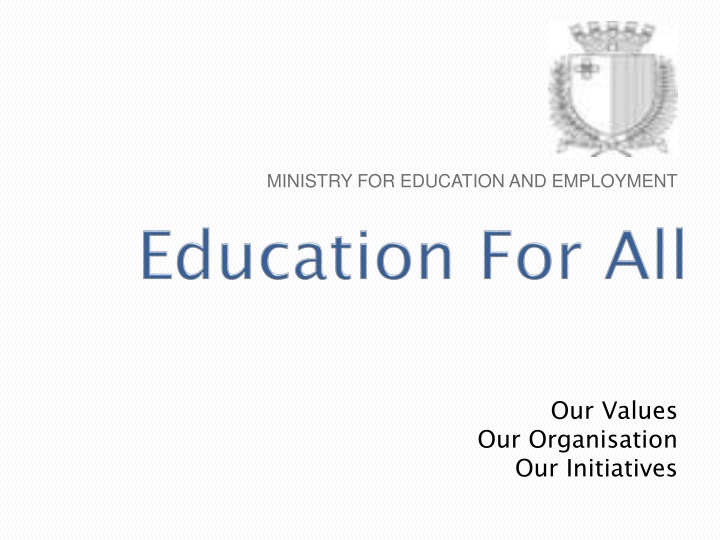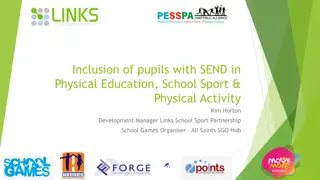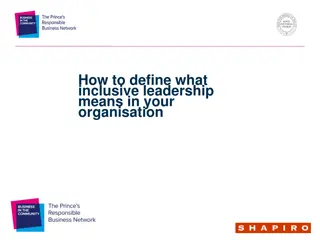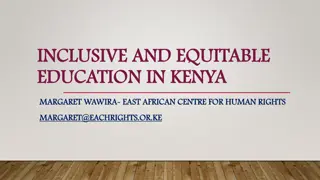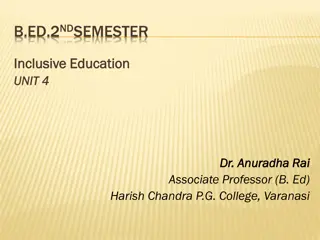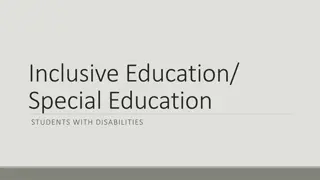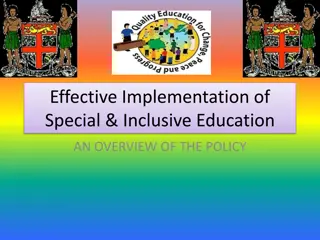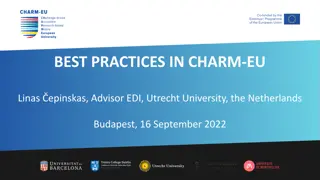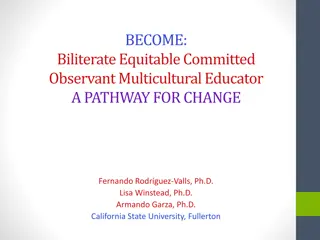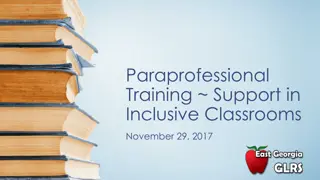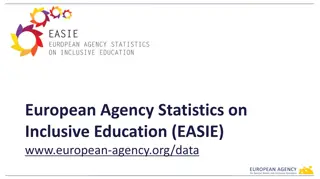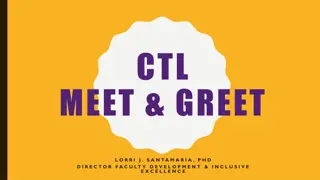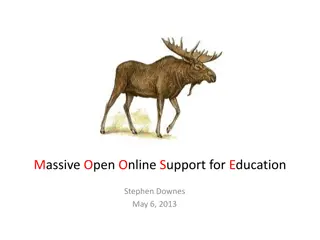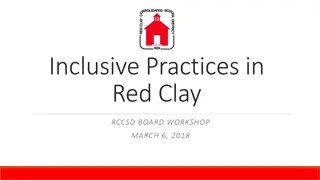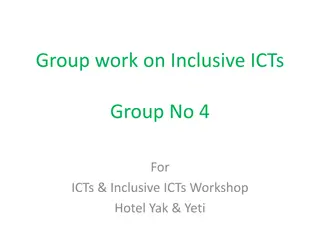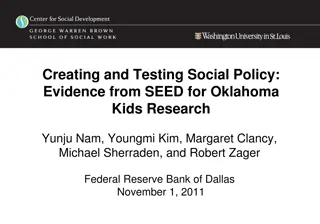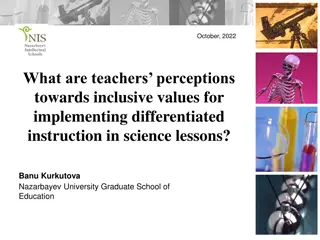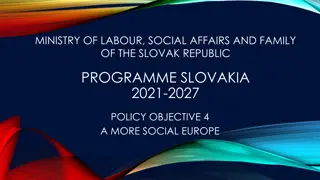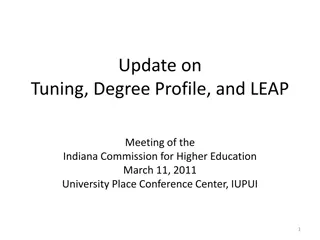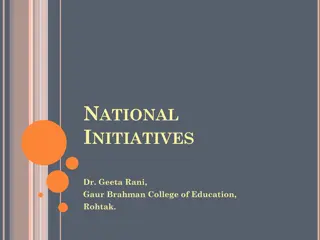Education for All Development Model and Inclusive Initiatives
Inclusive education initiatives for all learners, focusing on creating clarity, empowering stakeholders, and continuous professional development. Recommendations for a national dialogue on education structures and developmental processes to support high-quality education for all.
Download Presentation

Please find below an Image/Link to download the presentation.
The content on the website is provided AS IS for your information and personal use only. It may not be sold, licensed, or shared on other websites without obtaining consent from the author.If you encounter any issues during the download, it is possible that the publisher has removed the file from their server.
You are allowed to download the files provided on this website for personal or commercial use, subject to the condition that they are used lawfully. All files are the property of their respective owners.
The content on the website is provided AS IS for your information and personal use only. It may not be sold, licensed, or shared on other websites without obtaining consent from the author.
E N D
Presentation Transcript
MINISTRY FOR EDUCATION AND EMPLOYMENT Our Values Our Organisation Our Initiatives
Audit 2015 Results Audit 2015 Recommendations Education for All Development Model 2
Inclusive education is seen as fragmented and not sufficiently coherent; Inclusion is viewed as just another initiative or a charitable initiative, instead of as a learner s right; Stakeholders do not feel sufficiently enabled and empowered. Creating clarity around the concept of inclusion leading to a review of legislation and policy Re-focusing support to increase the capacity of colleges and schools to meet all learners needs Establishing a national training body to provide continuous professional development (skills, knowledge and understanding) for all education leaders, educators and support personnel Results 3
Recommendation: National Dialogue Setting up of Education for All structures and developmental process: Steering Committee, Core Group, Stakeholder Dialogue, Development Team Austrian Delegation 24/10/16 5
High Quality EducationforAll, through dialogue, resolvestowork and support all stakeholders in order to ensure that each and every learner will learn to know, to do, to be and to live together 6
Working collectively and collaboratively to improve student learning, behaviour, well being and the conditions that support these practices Working collectively and collaboratively to improve student learning, behaviour, well being and the conditions that support these practices Senior Management Team Teachers: Early years, Primary, Middle and Senior Students Parents and families Local Learning Support Assistants Organisations Ancillary staff members Residents 7
Development of concepts of priority areas in consultation with different stakeholders. Development of concepts of priority areas in consultation with different stakeholders. Evaluation and reviewing of project Education for All project in 2 primary schools from 2 Colleges in Malta and 1 in Gozo Education for All project in 2 primary schools from 2 Colleges in Malta and 1 in Gozo Working Groups developing action plans Working Groups developing action plans 8
From Special Needs Learners with Special Needs Education for All All Learners Knowing & addressing the needs of all learners 9
Stakeholders College Principals and Heads of Schools (roll out) Steering Committee Core Group Development Team Respective working groups including: i. College Principals ii. SMT (Church, State, Independent) iii. Educators iv. Parents 10
Leadership and Good Governance Organisation of Support, Resource and Strategies in Colleges and Schools Initial Training and CPD Curriculum Development Positive Learning Communities Evaluation and Internal review Research 11
Leaders at all levels that: Have vision, mission and values Create teams, empower people, and develop stakeholders potential Facilitate constructive dialogue with all stakeholders leading to a clear plan of action while catering for the needs of all learners Think creatively and use innovative and pro- active strategies in order to challenge the status quo and bring about change in practices, policies and structures 12
Parental Engagement Learner Engagement Community Engagement 13
Evaluation and review of current processes and procedures within the educational systems Identification of the current strengths, weaknesses and needs at national, college and school level Strengthening of decision making processes Development of informed national, college and school policies based on the strengths 14
E.g. BM 88 E.g. Communication hubs E.g. Trans, Gender Variant and Intersex Students in school policy E.g. Dyslexia-friendly, autism-friendly, accessibility 15
Teacher together with Class Assistant plan strategies, support and assessment in relation to curriculum for all learners in the class Monitoring of all learners progress Adjustment of strategy and support Monitoring and evaluation When a learner, after the necessary adjustments is still not reaching his set outcomes the class team in consultation with the HoS will call on the support of specialised support staff within the school and College and/or other Agencies and Units according to the needs of the learner to form a professional learning team (PLT). The PLT will plan more personalised strategies, support and assessment using quality resources. Learner s progress continues to be monitored and strategies and support continue to be adjusted accordingly. 16
Evaluation and Development Educators Strengths and Areas of Development Educator Educator relationship Educator Learner relationship Educator Community relationship Up-skilling Learning and Social Environment 17
In order to continually improve on the quality and processes a review mechanism will be set up as an integral development process to the implementation 18
The Education for All is a process of development within schools that aims to provide high quality educational experiences resulting from meeting the diverse needs of each learner in order to ensure that each learner achieves through learning to know, to do, to be and to live together. This can only be achieved by moving away from a one size fits all system of education. Austrian Delegation 24/10/16 19
